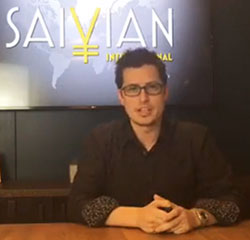Ryan Evans heads towards Saivian fraud trial
 As per a Status Report filed by the SEC on May 4th, Ryan Evans has refused to settle his Saivian fraud case.
As per a Status Report filed by the SEC on May 4th, Ryan Evans has refused to settle his Saivian fraud case.
The parties have met and conferred several times regarding the potential to resolve this matter, including after the resolution of the matter as to the other defendants.
Unfortunately, the parties have so far been unable to reach a settled resolution.
This means that Evans’ June 7th trial will proceed as scheduled.
 A May 29th filed Joint Statement provides a run-down of the case;
A May 29th filed Joint Statement provides a run-down of the case;
This is a civil action, brought by the United States Securities and Exchange Commission, sometimes referred to as the “SEC.”
The SEC is the agency of the federal government that is responsible for enforcing the securities laws of the United States.
The SEC has filed a civil complaint against Ryan Evans asserting claims that Mr. Evans violated federal securities laws.
The SEC alleges Mr. Evans, engaged in fraud when he made and disseminated false or misleading statements and/or omissions in connection with the offer, purchase, and sale of a security known as a “Cashback Membership” offered and sold by group of companies collectively known as Saivian LLC or Saivian International Limited, which I will refer to as the “Saivian Companies.”
Specifically, the SEC alleges the Mr. Evans made material misstatements or omissions concerning how the Cashback paid to Cashback Members was being funded.
In addition, the SEC alleges that Mr. Evans engaged in a scheme or artifice to defraud investors by his misstatements or omissions and/or in his promotion of the Saivian Companies’ Cashback Memberships, which the SEC alleges was a Ponzi scheme.
The SEC has the burden of proving its claims by a preponderance of the evidence.
Mr. Evans denies he has any liability and asserts that the SEC [lacks jurisdiction and] will not be able to meet its burden to prove that Mr. Evans engaged in any alleged fraud.
Mr. Evans contends that any statements he made were accurate or forward-looking when made based on the information available to him at the time or were not material to Cashback Members.
Mr. Evans also contends the Saivian Companies were not a Ponzi scheme but were one of many legitimate startup companies, and were not inevitably fated to collapse due to multiple sources of actual and potential revenue they were working to grow, and also had profits from Members who purchased Cashback Memberships but did not submit enough receipts to earn more in cashback than they paid.
BehindMLM reviewed Saivian back in 2015, correctly identifying it as a Ponzi scheme at the time.
 Of note are Evans’ partners-in-crime, Eric J. Dalius and James John Sheehan, have settled with the SEC.
Of note are Evans’ partners-in-crime, Eric J. Dalius and James John Sheehan, have settled with the SEC.
Dalius primarily operated and was the face of Saivian. Following lengthy delays, Dalius settled with the SEC for $24 million back in February.
Interestingly enough, following objections from Evans, he and the SEC have reached an agreement excluding facts supporting Saivian being a Ponzi scheme.
This is from a stipulation filed on May 27th;
It is hereby stipulated and agreed …
1. Neither party will introduce any evidence that Dalius allegedly “personally reaped substantial sums from Saivian investors”;
2. Neither party will introduce any evidence discussing, concerning, or referencing the six dismissed Relief Defendants formerly parties to this action;
3. Neither party will introduce any evidence that Dalius allegedly commingled funds obtained by the Saivian Companies with his own personal funds;
4. Neither party will introduce any evidence that Dalius allegedly used funds from the Saivian Companies to fund “a lavish and luxurious lifestyle” for himself and his family;
5. Neither party will introduce any evidence that Dalius allegedly converted enough Bitcoin to realize more than $164 million from the Saivian Companies and/or that most of these funds went to his personal benefit;
6. Neither party will introduce any evidence that Dalius allegedly purchased real estate with funds obtained from the Saivian Companies;
7. Neither party will introduce any evidence that Dalius allegedly transferred funds to brokerage trading accounts to fund stock
purchases;8. Neither party will introduce evidence that Dalius allegedly converted funds received in connection with the Saivian Companies for private jet travel, luxury vacations, sporting and entertainment event tickets, car purchases, family vacations, or any other personal expenses;
9. Neither Party will introduce evidence that Dalius allegedly purchased real property titled in the name of the dismissed Relief Defendants from the funds obtained in connection with the Saivian Companies;
10. Neither party will introduce evidence that Dalius allegedly refused to answer whether he had allegedly destroyed any documents Plaintiff subpoenaed of him in his investigative testimony;
11. Neither party will introduce evidence that Dalius allegedly refused to produce documents in response to Plaintiff’s subpoenas;
12. Neither party will introduce evidence that Dalius allegedly attempted to block others from producing document in response to Plaintiff’s subpoenas.
While that’s a whole lot of incriminating evidence being excluded, the SEC appears confident enough to proceed without it.
On May 24th, the SEC was granted partial summary judgment in their claims against Evans. The granted summary judgment pertains to Saivian violating Section 5 of the Securities and Exchange Act.
The SEC’s remaining Causes of Action will be decided at trial.
Update 2nd June 2023 – Ryan Evans has abandoned plans to face off against the SEC in court.
On May 31st, Evans reached a settlement with the SEC. The settlement is before the SEC’s Commissioners awaiting approval.


Excellent. I do love handing scammers a shovel to dig their own graves.